A round-up of activities of the UN system in Somalia in February 2023
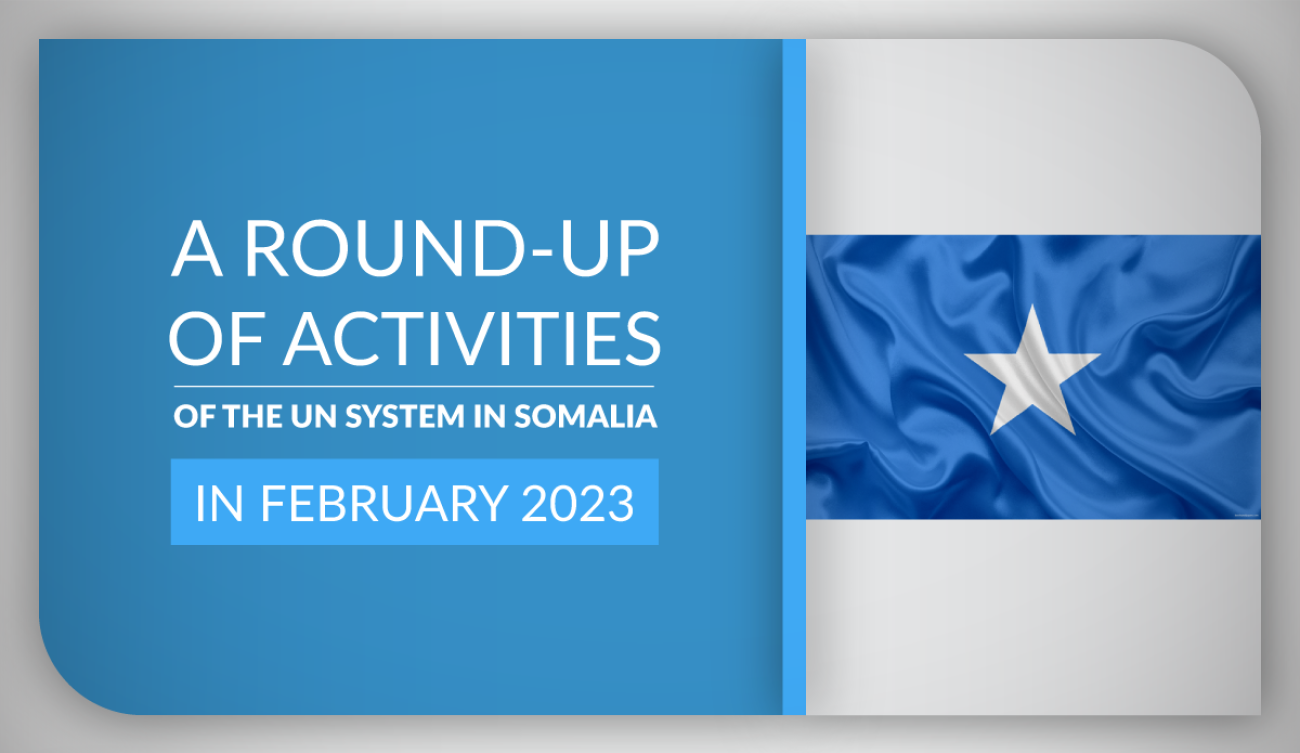
Highlights of some the UN work in February 2023
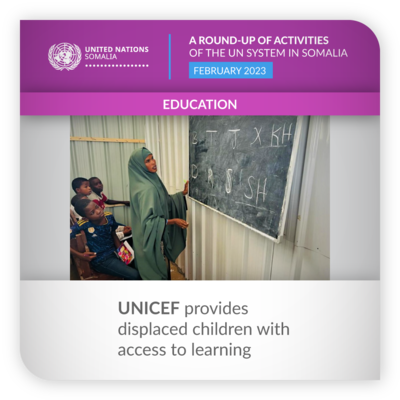
Education | UNICEF provides displaced children with access to learning
The prolongated drought in Somalia has exacted an extensive toll on access to education, with an estimated 3.85 million children and school personnel requiring humanitarian education assistance, and some 1.7 million of them being displaced.
As part of the Emergency Drought Response Programme, UNICEF and partners are providing 16,732 displaced children with access to learning in schools and temporary learning spaces across 12 drought-affected districts.
The programme is focused on teaching Accelerated Basic Education level one curriculum and bringing learning to children in sites of displacement. It includes emergency support, temporary learning spaces with gender sensitive water, sanitation and hygiene facilities, drinking water, teaching and learning materials, as well as training and support to teachers.
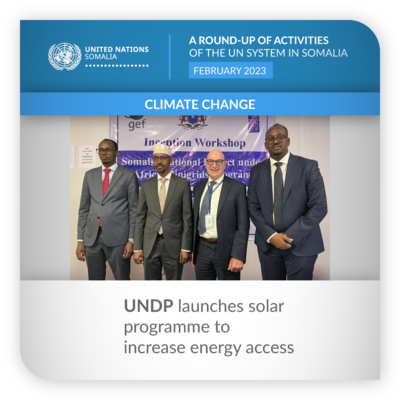
Climate change | UNDP launches solar programme to increase energy access
UNDP and the Federal Government of Somalia launched the Somalia arm of the Africa Minigrids Program (AMP) to increase access to electricity, bring new development opportunities to rural communities and contribute to putting the country on a sustainable development path.
Funded by the Global Environment Facility, the Africa Minigrids Program is a regional energy access programme led by UNDP, in partnership with the Rocky Mountain Institute and the African Development Bank.
The AMP works with 21 countries in Sub-Saharan Africa to promote scaled-up investments in solar minigrids with the aim of increasing access to sustainable, affordable energy while supporting climate action.
The AMP Somalia project will be implemented by UNDP in partnership with the country’s Ministry of Environment and Climate Change, Ministry of Energy and Water Resources and the private sector.
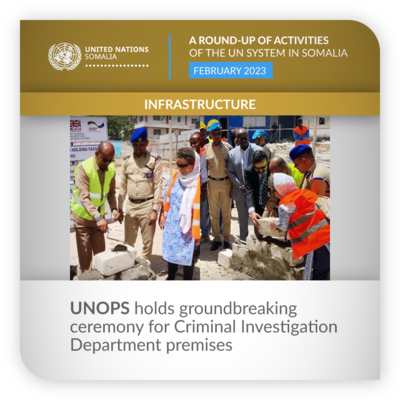
Infrastructure | UNOPS holds groundbreaking ceremony for Criminal Investigation Department premises
UNOPS held a groundbreaking ceremony in Mogadishu for the new Criminal Investigation Department (CID) facility for Somalia’s police force.
The event was attended by the State Minister for Interior Security, Mohamed Ali Haga; the country’s Police Commissioner, General Sulub Ahmed Firin; a representative from the European Union, Veronique Geoffroy; and the acting Country Director for UNOPS in Somalia, Sayed Mohammad.
The CID, a critical component of the Somali Police Force, operates throughout the country and is responsible for handling investigations, fingerprinting, criminal records, immigration matters, and passport services.
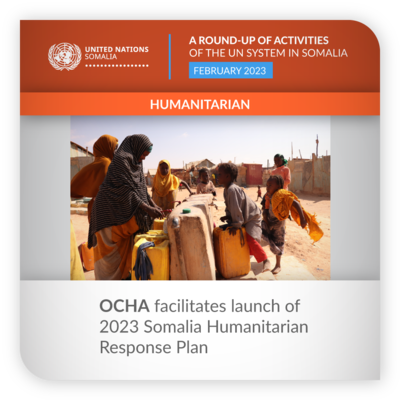
Humanitarian | OCHA facilitates launch of 2023 Somalia Humanitarian Response Plan
OCHA facilitated the release of the Somalia 2023 Humanitarian Response Plan (HRP) to help the millions of Somalis in urgent need of humanitarian aid.
The event was jointly launched by the Humanitarian Coordinator for Somalia, the Federal Government of Somalia, and international donors and partners.
The HRP seeks $2.6 billion to assist 7.6 million people, who make up more than 90 per cent of the 8.25 million people who need life-saving assistance. The number of people in need stems from a projection based on the 2022 post-gu assessments and may change with future assessments, according to OCHA.
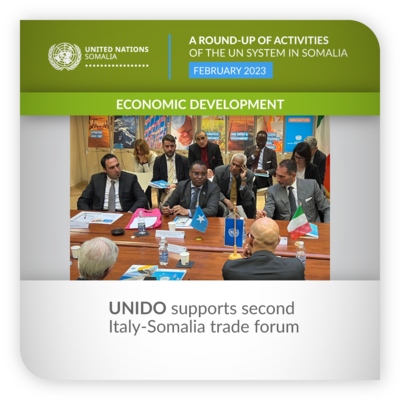
Development | UNIDO supports second Italy-Somalia trade forum
UNIDO plans to support the holding of the second Italy-Somalia Business and Trade Forum, which was announced by Somalia’s Minister for Commerce and Industries, Jibril Abdirashid Haji.
The forum will take place in Rome in May, and will aim to promote Somalia as a destination for business for international companies.
The announcement came during a visit to Italy by the President of Somalia, at a roundtable also attended by the Ambassador of Italy in Somalia, Alberto Vecchi. The roundtable also covered the state of business relationships between Italy and Somalia, as well as the progress made by UNIDO’s on-the-ground support, which includes investment promotion and trade fairs, and which is funded by Italy.
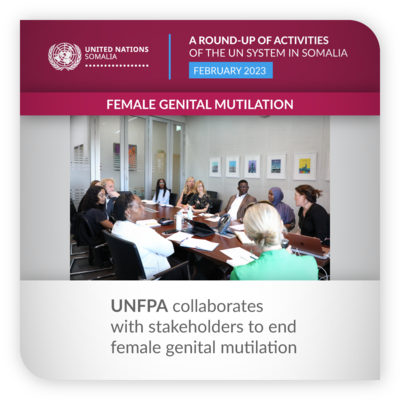
Female Genital Mutilation | UNFPA collaborates with stakeholders to end female genital mutilation
On the International Day of Zero Tolerance for Female Genital Mutilation, which is marked on 6 February annually, UNFPA participated in the ‘Dear Daughter’ Campaign working group which aims to help end the practice of Female Genital Mutilation (FGM) in Somalia.
The working group’s meeting was organised by the Ifrah Foundation and the Embassy of Ireland, and it brought together experienced and committed partners to support the scale-up and rollout of the ‘Dear Daughter’ campaign against FGM.
The working group's members work together to plan appropriate actions and identify resources necessary to achieve the goal of ending FGM in Somalia, in addition to providing a space to share expertise, knowledge and collaboration on specific issues tied into the practice, such as anti-FGM legislation and building community awareness and outreach.
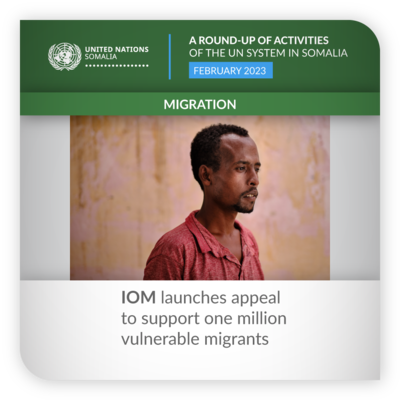
Migration | IOM launches appeal to support one million vulnerable migrants
IOM and its partners are appealing for $84 million to provide lifesaving humanitarian assistance, protection interventions and development support to one million migrants and host communities on the route from the Horn of Africa to Yemen and the Gulf, known as the ‘Eastern Route.’
Every year, more than 250,000 migrants, including young men, women and children, leave their countries in the Horn of Africa, including Somalia, for the Gulf nations in search of better livelihood opportunities.
According to IOM, recent trends indicate an increase in the movement of young women and children who are at high risk of gender-based violence, trafficking and violence along the route. The devastating effects of climate change, conflicts and overall, poor socio-economic conditions remain the key drivers of migration.
IOM’s actions in the appeal come within the context of its role as the coordinator of the multi-agency regional Migrant Response Plan for the Horn of Africa and Yemen. The appeal is a joint effort with the governments of Ethiopia, Djibouti, Somalia and Yemen, and 48 partners made up of UN agencies and non-government agencies.
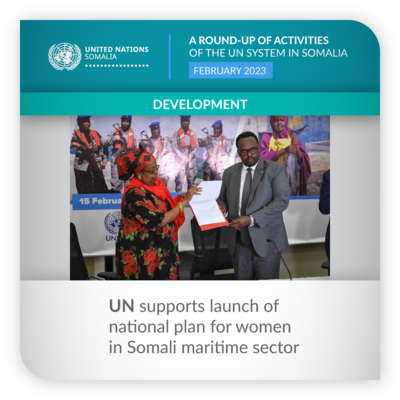
Development | UNSOM supports launch of national plan for women in Somali maritime sector
UNSOM supported the launch of a new national action plan for enhancing and empowering Somali women in their country’s maritime sector.
“The Women in Maritime Sector (WiMS) National Action Plan will help to ensure that women operating across the maritime domain are provided increased visibility and opportunities to not only participate in, but also benefit from, the sector,” the UN Secretary-General’s Deputy Special Representative for Somalia, Anita Kiki Gbeho, said in her remarks at the launch event in Mogadishu.
Somalia’s maritime domain is widely considered as providing immense economic opportunities in the ‘Blue Economy.’
However, there is a critical shortage of maritime skills due to the lack of educational and institutional capacity, and a significant gender inequality.
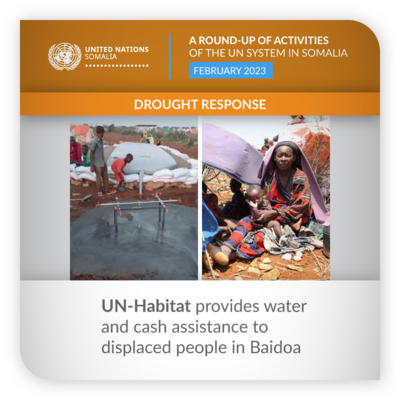
Drought response | UN-Habitat provides water and cash assistance to displaced people in Baidoa
As a response to the ongoing drought, temporary water trucking was delivered to 410 drought-affected households living in the ADC area of Baidoa for a duration of two months, ending in February this year.
During this time, beneficiaries were able to collect 10 litres of water per day/per person for drinking and domestic use by using a voucher system. Alongside this, UN-Habitat also provided unconditional cash assistance to 200 families for the same period.
This was designed to mitigate the effects of the recent spike in arrivals of internally displaced people (IDP) to Baidoa, which resulted in further water scarcity in IDP settlements. UN-Habitat also made external partnerships to secure two more water bladders to promote access to water and increase the number beneficiaries being supplied with water.
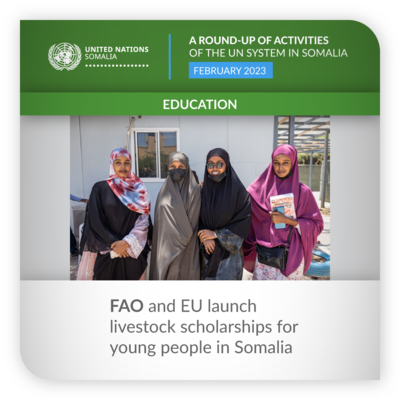
Education | FAO and EU launch livestock scholarships for young people in Somalia
More than 100 young women and men have received scholarships to study livestock programmes to bolster technical capacity within this key productive sector of Somalia.
Supported by FAO and the European Union (EU), through the ‘Resilient Fisheries and Livestock Value Chain for Inclusive and Sustainable Growth in Somalia’ (RAAISE) project, the initiative enables young people to study at the Somali National University in Mogadishu for three years, covering the costs of their tuition fees and graduation projects. The last group of students will graduate in January 2025 with a Bachelor of Science in Veterinary Medicine and Bachelor of Science in Animal Husbandry.
The new scholarship programmme underlines the importance of tertiary education in building capacities in sustainable livestock management, and recognizes the sector as a critical avenue of development in Somalia, requiring joint commitment and a strong skills base that can meet the challenges of the future.













